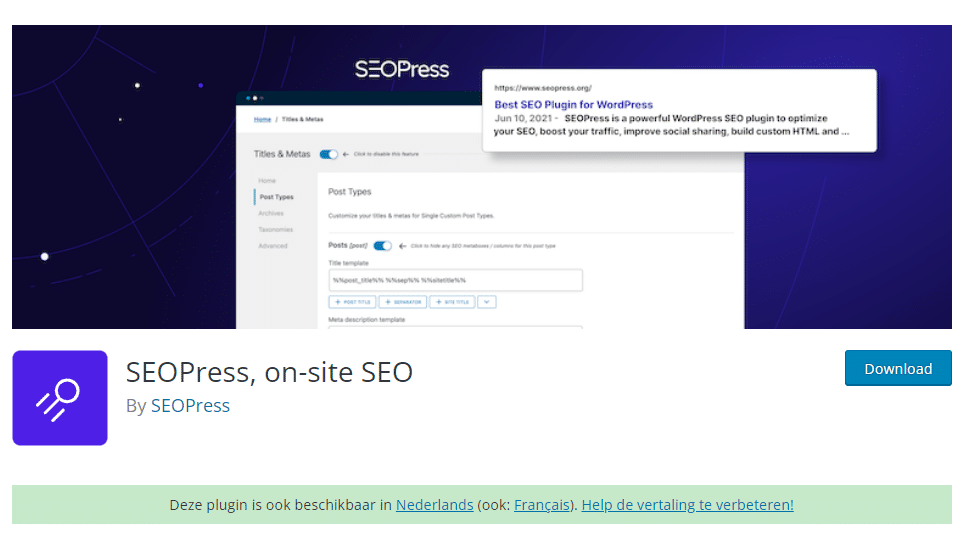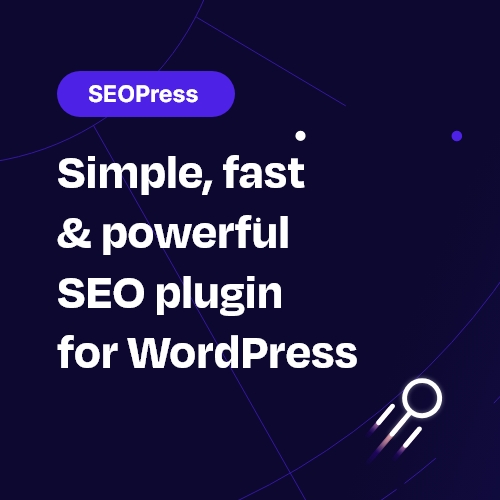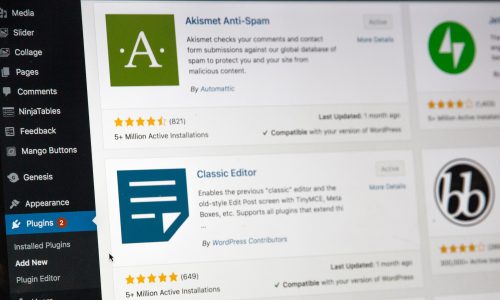To make your website findable through Google, your site needs to answer the questions of your target audience through its content.
Once you’ve determined that, you can use the WordPress plugin SEOPress to better match your specific page to an existing search in Google.
There are of course a few other factors to rank well in Google (page speed for example) but answering concrete questions is definitely your first priority.
SEO and keywords
By 2021, Google reported that there are up to 3.5 billion searches per day. Obviously, that’s a huge amount and it goes without saying that your website shouldn’t necessarily rank for every search.
But wait a minute. What is ranking? If you look up “buy mobile phone” in Google, first you’ll see a number of paid ads and just below those you’ll see the results that “rank organically” for that search.

Now you can imagine that it is very important to have your website rank as high as possible in the search results. The highest positions get the most clicks:
- position 1 (or rank 1): 31% clicks
- position 2: 25%
- position 3: 19%
- position 4: 14%
- position 5: 10%
In that sense, keywords are the search queries for which you want your website to rank high in Google search results.
And it’s best to look at this very broadly: all searches that are interesting for your ideal customers are also interesting for you. They “attract” potential buyers to your website so they can get to know your company.
Keywords are also often a combination of different words (“how much does an iPhone 11 cost”). Contrary to what many people think, it is not necessarily one word (it can be), but a combination of different words.
Different types of keywords
All keywords are obviously not equal. For example, you can classify them according to intent or purpose.
Roughly speaking, there are “information searches”, “commercial searches” and “transactional searches”.
Let’s take another example with the search intent linked to it
- which mobile phone to buy? : information
- samsung smartphones price comparison: transition between information and commercial buy
- iPhone 11: transactional
- why buy iPhone 11: commercial (because decision already taken) but looking for information
And so you can continue for a while. Because the offer of a company that sells mobile phones, is of course broader than that.
If you want to know which variants there are, you can take a look at the website of Answer The Public.
For example, there are 8 questions around “why” to buy an iphone :
- why buy iphone
- why buy iphone se
- why buy iphone 11
- why not buy iphone 12
- why buy iphone xr
- why buy iphone 7
- why buy new iphone
But there are many other dimensions such as “when”, “what”, “where” and “which”.
In short, if you sell iPhones, it’s best to look there to see what exactly is being searched for. Often these are “information” searches, but there are also commercial searches (for example: “where to buy iPhone with eco checks” 😉 ).
From a commercial point of view, of course the commercial and transactional search queries are the most interesting. But it’s also best to pay attention to the information search queries in order to lead extra people to your website, so that they can become acquainted (indirectly) with your commercial offering.
Keywords for B2B
If you work b2b (business-to-business), the above mechanism is not fundamentally different. However, there are often fewer searches, which makes it even more important to choose the right one.
There are some tactics that are just a little bit different and you should take them into account:
- In b2b, many companies tend to ignore the “commercial” and “transactional” searches and focus on the “information” searches.
- You’re not looking for keywords that will attract many visitors to your website. In b2b, quality prevails over quantity.
- Don’t make your pages/messages too general, but really focus on content that helps your visitors. This post has in any case the intention to help our visitors and is certainly not too general.
- Have an opinion: here we can also conclude that this is not done very often. Usually a post is a message with objective information, but no personal input.
Investigate search volume of keywords
You’ve now started working and you probably have a huge number of keywords. If you really have too much time on your hands, you could now get busy trying to get your website to rank for all those keywords, but that’s obviously not an ideal approach.
You should actually have a tool to estimate the potential of a keyword. The good news is that one exists (😉 ). The bad news is that you can only retrieve a limited amount of data per day.
That tool is Ubersuggest by Neil Patel.

Above you see the results that you can obtain by searching for example on the commercial keyword “buy mobile phone” (you don’t know yet which one …)
Immediately you see the potential of that search (6600), but also know that most searches where there is a lot of volume (so many people are looking for) are usually also the most difficult to score with your website.
Looking at this list, for example, I would rather work on searches with smaller volume (“buy mobile phone with ecocheques” – 210 searches) because there is less competition for that.
The exercises and analysis mentioned above are often also described in the professional literature as a keyword research.
What is SEOPress
SEOPress is a free WordPress plugin that allows you to optimize the technical settings of your website for Google on the one hand, but also allows you to optimize your different pages and posts for a specific search query on the other hand.
There is both a paying (the Pro version) and a free version of this plugin. As usual, the paid plugin contains a lot of extra features (html sitemap for example and xml sitemaps), including an extended module to integrate rich snippets on your page.
Of course, SEOPress is just one of the tools you can use to get your on-page SEO in order. Here you can find an overview of all SEO plugins for WordPress.
You can also adjust the way your page is displayed in the search results and optimize it for a good CTR or click-through-rate.
And that is exactly the reason why I started this article with an explanation of the strategy behind keywords and the art of choosing the right ones.
All those SEO WordPress plugins help you apply your keyword strategy. But the strategy comes before the execution. There is no point in installing SEO plugins without a strategy.
The Yoast plugin (which is actually a lot more popular than SEOPress) also works the same way.
How to optimize your page or post in function of a search query
Determine how your page will be displayed in search results
The first settings you can change that will determine how your page is displayed in the search results can be found at the bottom of the Gutenberg editor (for posts).
Important: try to write the texts in such a way that people click on your link in the Google search results. We call this the CTR or click-through-rate. But of course you shouldn’t go as far as “click bait”.

As you can see, there are two things you can adjust:
- First of all, there is the title
- and secondly, the so-called “meta description”: this is displayed at the bottom of the link to your website in the Google search results. SEOPress will help you to determine the ideal length of this text.
- On the right, you can see the result

You can optimize a lot by adjusting these texts. The goal should always be to maximize clicks.
How to optimize your texts in function of the specific search query of the page in question
The next step now is to add your desired search query for which the page should score.

The nice thing about SEOPress is that you can also enter multiple search queries and thus optimize your page or post for multiple keywords.
For example, if you enter the search query “buy mobile phone with ecocheques” into Google, you’ll often see a block with “people also ask” which can give you additional info on what possible secondary keywords might be.

Once you’ve entered that, SEOPress will give you a bunch of tips on what to do next to improve your text.

All you have to do now is read these tips and adapt your text according to the tips given.
Some common tips provided by SEOPress
- Keyword density: you should use the keyword in question several times in your text. The density is an indication of how many times the keyword is used in the text.
- words counter: thin content or short texts are often not good for ranking for a certain keyword. SEOPress will give you a hint on how long you should make your text.
- Internal links: gives an idea of whether other pages on your website link to your current page. The golden rule is the more links point to your page, the more important it should be on your website. Use links to other pages as well in order to link to information on other pages.
- headings: indicates whether you are using the titles and subtitles correctly. Best is to use strategic h2 and h3 headings to structure your text. H2 is a subtitle and H3 a subtitle. For example, this article has 8 x H2 and 3x H3 (which are covered by an H2).
- meta title: comments on the meta title of your page
- meta description: comments on the meta description
For the last two tips, it should be noted that the comments usually relate to the length and whether or not a keyword is present.
Conclusion
So if you want your website to score on certain keywords, it’s best to look for keywords that are strategically and commercially the most interesting. In that mass of data, you can set priorities in function of the search intention and the potential based on the number of searches.
In many articles we emphasize the integration of Google Analytics. In this case GA usually shows little about the results of the searches on which your site is found. In this case we recommend you to also work with Google Search Console and link it to Google Analytics.
Once you have determined this, a plugin like SEOPress or Yoast will be able to help you optimize your page according to the chosen keyword.











